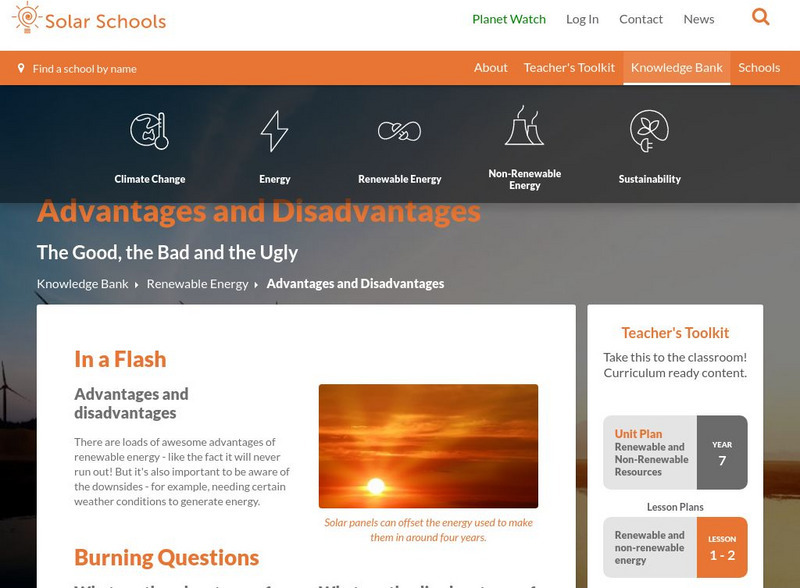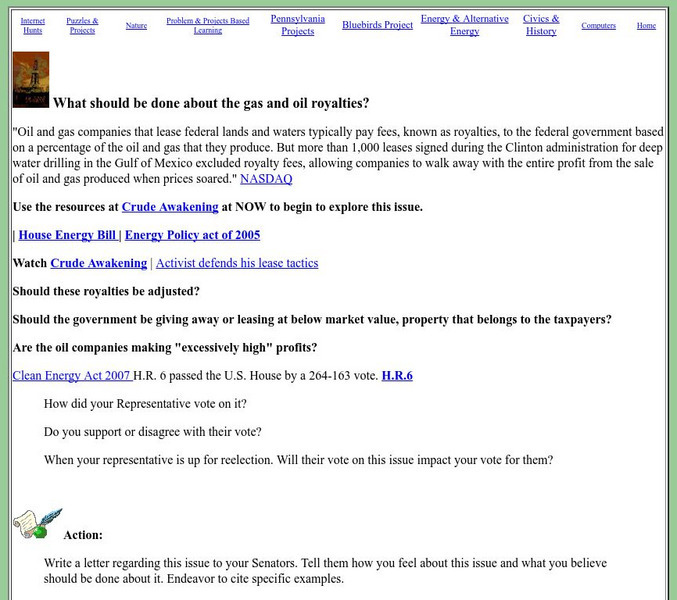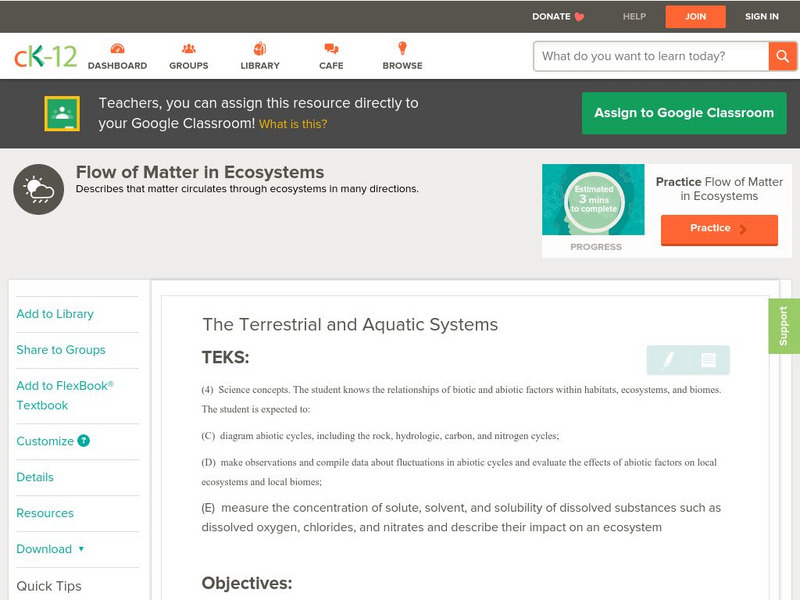Alabama Learning Exchange
Alex: Conserve It to Preserve It
In this lesson from "The Friends of Auntie Litter", (www.auntielitter.org), conservation and describing ways to sustain natural resources will be explored. This lesson is one from the "Take Pride Statewide" series. *This lesson is...
TeachEngineering
Teach Engineering: Rolling Blackouts & Environmental Impact
The goal is for the students to understand the environmental design considerations required when generating electricity. The electric power that we use every day at home and work is generated by a variety of power plants. Power plants...
Polk Brothers Foundation Center for Urban Education at DePaul University
De Paul University: Center for Urban Education: Natural Gas: An Energy Resource [Pdf]
"Natural Gas: An Energy Resource" is a one page, nonfiction, reading passage about how natural gas is located, drilled for, and sent through pipelines throughout the country to people's homes. It is followed by questions which require...
Polk Brothers Foundation Center for Urban Education at DePaul University
De Paul University: Center for Urban Education: Natural Gas: An Energy Resource [Pdf]
"Natural Gas: An Energy Resource" is a one page, nonfiction, reading passage about natural gas, its uses, and how it gets to homes. It is followed by constructed-response questions which require students to provide evidence from the...
Energy for Sustainable Development
Kids and Energy: Hydro Energy
Hydropower is a clean, renewable and reliable energy source which converts kinetic energy from falling water into electricity, without consuming more water than is produced by nature. Quite simply the oldest method by which renewable...
TeachEngineering
Teach Engineering: Biorecycling: Using Nature to Make Resources From Waste
By studying key processes in the carbon cycle, such as photosynthesis, composting, and anaerobic digestion, learners learn how nature and engineers biorecycle carbon.
Other
Solar Schools: The Advantages and Disadvantages of Renewable Energy
One major advantage with the use of renewable energy is that as it is renewable it is therefore sustainable and so will never run out. Renewable energy facilities generally require less maintenance than traditional generators. Their fuel...
Cosmo Learning
Cosmo Learning: The Atmosphere, the Ocean, and Environmental Change
A collection of video lectures from a course that explores the physical processes the control Earth's atmosphere, ocean, and climate that is taught at Yale University. The course covers topics like clouds, rain, severe storms, regional...
Alabama Learning Exchange
Alex: Conserve It to Preserve It
In this lesson from "The Friends of Auntie Litter", (www.auntielitter.org), conservation and describing ways to sustain energy will be explored. Students will also create a web diagram of ways to conserve energy. This lesson is one from...
CK-12 Foundation
Ck 12: Earth Science: Coal Power Study Guide
This comprehensive study guide covers the main terms and concepts needed for an earth science unit on coal power. Review questions are included at the bottom of the study guide.
University of St. Andrews (UK)
University of St. Andrews: Albert Einstein
A truly complete biography of the great man. Some adequate discussion of his theoretical and scientific work, but the accent here is on his personal life. Many anecdotes, many quotes from him, many references and hotlinks to other...
Other
Open2.net: Ecosphere
Designed by the Open University and the BBC, this website from Open2.net explores ecosystems. Included is a lengthy discussion on closed ecosystems and their importance to research, as well as a virtual ecosystem, an interactive showcase...
Cynthia J. O'Hora
Mrs. O's House: What Should Be Done About Oil and Gas Royalties?
Engage the classroom in studying about oil and gas royalties paid to the government, in some cases not paid, with resources drawn from leased land paid for by the government. Take research results and contact state and federal government...
PBS
Pbs Learning Media: Einstein: How Smart Was He?
This essay from the NOVA Web site explores the impact Einstein made on physics and most everything we know about the cosmos.
PBS
Pbs Learning Media: Sources of Radiation
This interactive activity from the NOVA: "Dirty Bomb" Web site explores sources of radiation, both harmful and beneficial, natural and manmade.
Other
The Sustainable Scale Project: Ecological Footprint
The Ecological Footprint is rooted in the fact that all renewable resources come from the earth. It accounts for the flows of energy and matter to and from any defined economy and converts these into the corresponding land/water area...
CK-12 Foundation
Ck 12: Earth Science: Flow of Matter in Ecosystems
[Free Registration/Login may be required to access all resource tools.] In this module, students will learn about the cycles of nature (water, carbon, nitrogen, and phosphorus) that support the flow of nutrient matter through an...
University of Texas at Austin
University of Texas: Human Environmental Interactions [Pdf]
Inspired by Hemispheres' 2004 Teachers' Summer Institute, People and Place: Human-Geographic Relations, this curriculum unit was designed to address human adaptation to and modification of the environment. How have humans adjusted to...




![De Paul University: Center for Urban Education: Natural Gas: An Energy Resource [Pdf] Unit Plan De Paul University: Center for Urban Education: Natural Gas: An Energy Resource [Pdf] Unit Plan](https://d15y2dacu3jp90.cloudfront.net/images/attachment_defaults/resource/large/FPO-knovation.png)








